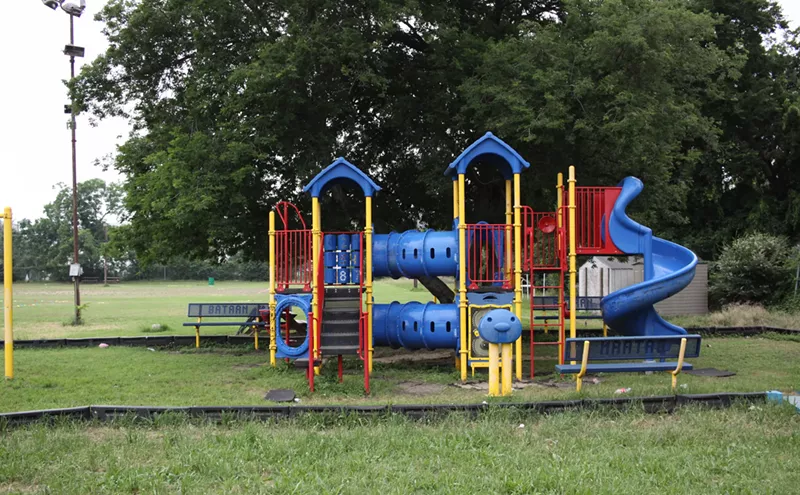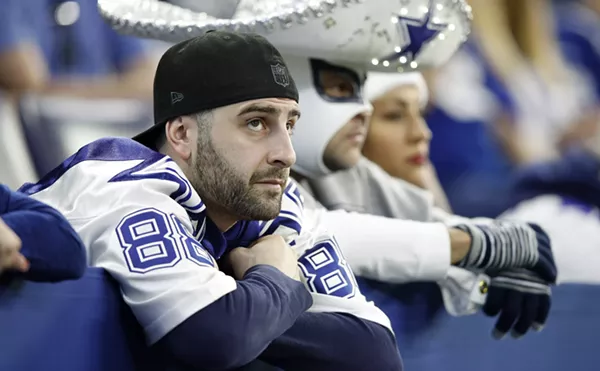On September 21, 2001, Rais Bhuiyan, then 27 years old, was working behind the cash register of a Texaco station in Pleasant Grove when a man wearing a bandanna, sunglasses and a baseball cap walked into the station holding a gun.
Bhuiyan, a slight, soft-spoken man with big eyes and a thatch of dark hair, thought he was being robbed. But instead of grabbing the cash from the till, the stranger did something odd. He asked a question.
"Where are you from?" the man demanded.
"Excuse me?" Bhuiyan replied.
So the stranger pulled the trigger.
"I felt the sensation of a million bees stinging my face and then heard an explosion," Bhuiyan later wrote in an editorial for The Dallas Morning News,long after his story had come and gone from the national news cycle. "Images of my mother, father and fiancée appeared before my eyes, and then, a graveyard. I didn't know if I was still alive."
He looked down at the floor and saw that blood was pouring from his head. He screamed for his mother. Then, realizing his attacker would likely shoot him again, he played dead.
Mark Stroman was 31 years old the day he shot Rais Bhuiyan. Stroman was an ex-con and meth abuser with previous convictions for credit card fraud, burglary, robbery and theft, and he'd been in trouble nearly all his life. By age 12, he'd already committed his first armed robbery. He'd done two prison bids by 2001, one for two years and another for eight. On September 15, 2001, he shot and killed Waqar Hasan, a 46-year-old convenience store clerk from Pakistan and a father of four. A week later, he shot Bhuiyan. And a couple weeks after that, on October 4, he murdered Vasudev Patel, a father of two and a clerk at a Shell station on Big Town Boulevard.
Stroman, a self-described white supremacist, claimed he'd lost a sister in the September 11 attacks on the World Trade Center (though it's not clear if that claim was ever verified), and said later that he wanted "to retaliate on local Arab Americans, or whatever you want to call them."
"I did what every American wanted to do but didn't," he told a reporter in a television interview. "They didn't have the nerve."
Bhuiyan survived his shooting, barely. He was blinded in his right eye, and he credits God with sending an angel to move his head slightly at the moment of the shooting; otherwise, he says, he would have lost vision in both. Photos taken of him a few weeks after the attack are shocking: His eye sags shut, dark pellet wounds dot his face, and one of his bottom teeth is knocked out. For six days after the attack, his parents only knew that their son had been shot in the face, but not if he was alive or dead. He couldn't move his mouth or speak. His father suffered a stroke from the stress.
Even after he had recovered somewhat, Rais couldn't fly home to see his parents, for fear that the pressure changes on the plane might have caused his injured eye to explode. "For six months, I holed up, praying to God to heal my badly scarred face so that people wouldn't recoil at the sight of me," he later wrote.
Yesterday, almost 10 years later, Bhuiyan stood in front of an audience of journalists and others in the Great Hall of SMU's Perkins School of Theology, dressed in a dark suit, a mint green shirt and a striped tie in muted colors. The only visible signs of his shooting are the sagging in his blinded eye and a slight stiffness in his face when he speaks. He was there to call for compassion on behalf of Stroman, the man who took his sight and the lives of two others.
"My mother taught me that if people hurt you, don't hurt them back," he told the audience, his voice occasionally breaking with emotion. "Today or tomorrow, they will ask for forgiveness."
Stroman was sentenced to death in April of 2002 for the slaying of Vasudev Patel (he was charged with the other two crimes, but only confessed to them after being arrested for shooting Patel). With his execution date scheduled for July 20, a little less than five weeks away, Rais Bhuiyan, his only surviving victim, is asking that he be spared and his death sentence commuted to life in prison.
"I strongly believe he was ignorant," Bhuiyan explained to the audience. "He couldn't differentiate right from wrong...By executing him now, we are losing everything." His Muslim faith, he said, teaches forgiveness, not vengeance.
Nadeem Akthar, the brother-in-law of another of Stroman's victims, Hasan, spoke at the press conference as well. "The last 10 years have been a long 10 years," he told the audience. "We've been going through a lot of turmoil...but we made it here." He quoted Sura 5, verse 32 from the Quran, something he said his sister, Hasan's wife, had wanted him to share. "If someone slays one person, he has slain mankind entirely," reads the verse. "And if someone has saved one person, he has saved mankind entirely."
"We forgive him," Akthar concluded. "God forgive him."
Rick Halperin, director of the SMU Embrey Human Rights Program, also spoke, along with a number of other local religious leaders from both the Muslim and Christian communities. "This type of request from a victim is unusual," Halperin said of Bhuiyan's call for forgiveness. He said that the District Attorney's office usually approaches a victim's family to ask if they want a death penalty to be pursued. He said Mrs. Hasan had also submitted a signed, notarized letter to District Attorney Craig Watkins's office, echoing Bhuiyan's call for commutation.
(Patel's family hasn't commented publicly on how they feel about the call to forgive Stroman. A family member, John Patel, told reporters immediately after Stroman's sentencing that the family was "very happy with the verdict," and that the brutality of the crimes merited the death penalty.)
Halperin said that Stroman had written him a letter two years ago, saying he was "deeply sorry for what he had done." Bhuiyan added that in 2004 and 2005 that Stroman had expressed remorse in media interviews, though he's never contacted Bhuiyan directly.
Halperin called on the district attorney's office, which has so far declined to comment, to answer Bhuiyan's request for commutation.
"The family members are in limbo" until this is resolved, he said. "As a matter of manners, the DA owes the family a reply."












